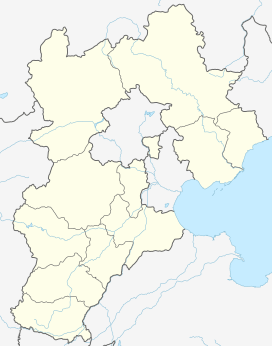Yongnian District
Yongnian is an urban district of the city of Handan, Hebei province, China. It is the seat of the Roman Catholic Diocese of Yongnian.
Yongnian 永年区 Yungnien | |
|---|---|
District | |
 Yongnian Location in Hebei | |
| Coordinates: 36°44′38″N 114°32′38″E | |
| Country | People's Republic of China |
| Province | Hebei |
| Prefecture-level city | Handan |
| Time zone | UTC+8 (China Standard) |
| Postal code | 057150 |
| Yongnian District | |||||||||
|---|---|---|---|---|---|---|---|---|---|
| Traditional Chinese | 永年區 | ||||||||
| Simplified Chinese | 永年区 | ||||||||
| Literal meaning | All Year District Longevity District | ||||||||
| |||||||||
| Former names | |||||||||
|---|---|---|---|---|---|---|---|---|---|
| Yongnian County | |||||||||
| Traditional Chinese | 永年縣 | ||||||||
| Simplified Chinese | 永年县 | ||||||||
| Literal meaning | All Year County Longevity County | ||||||||
| |||||||||
| Guangping Prefecture | |||||||||
| Traditional Chinese | 廣平府 | ||||||||
| Simplified Chinese | 广平府 | ||||||||
| Literal meaning | Expansively Pacified Prefecture | ||||||||
| |||||||||
| Ming Prefecture | |||||||||
| Chinese | 洺州 | ||||||||
| Literal meaning | Ming River Prefecture | ||||||||
| |||||||||
History
During the middle ages, the region was known as Ming Prefecture and administered from Mingzhou, now known as Guangfu. Guangfu continued to serve as the local seat of government when Ming Prefecture first became Guangping Prefecture and then Yongnian County. The area's population was about 220,000 in 1491;[1] 1,225,408 in 1820; 1,101,876 in 1883; and 1,734,036 in 1946.[2]
Administrative Divisions[3]
Towns:
- Linluoguan (临洺关镇), Dabeiwang (大北汪镇), Guangfu (广府镇), Yonghehui (永合会镇), Nanyancun (南沿村镇), Zhangxibao (张西堡镇)
Townships:
- Xiaolongma Township (小龙马乡), Xiaoxibao Township (小西堡乡), Zhengxi Township (正西乡), Dongyangzhuang Township (东杨庄乡), Xiyangcheng Township (西阳城乡), Xisu Township (西苏乡), Xihezhuang Township (西河庄乡), Qumo Township (曲陌乡), Liuhan Township (刘汉乡), Jiangwu Township (讲武乡), Liuying Township (刘营乡), Xinzhuangbao Township (辛庄堡乡), Jiehedian Township (界河店乡), Yaozhai Township (姚寨乡)
gollark: From xkcd, which is always right.
gollark: I heard that English had *half* that entropy.
gollark: > fe maleYou mean "iron man"?
gollark: What *is* the wall demon?
gollark: no.
References
Citations
- Bielenstein (1987), p. 90.
- Rozman (1982), p. 132.
- 邯郸市-行政区划网
Bibliography
- Bielenstein, Hans (1987), Chinese Historical Demography, AD 2–1982, Bulletin, No. 59, Östasiatiska Museet. * Rozman, Gilbert (1982), Population and Marketing Settlements in Ch'ing China, Cambridge: Cambridge University Press.
This article is issued from Wikipedia. The text is licensed under Creative Commons - Attribution - Sharealike. Additional terms may apply for the media files.